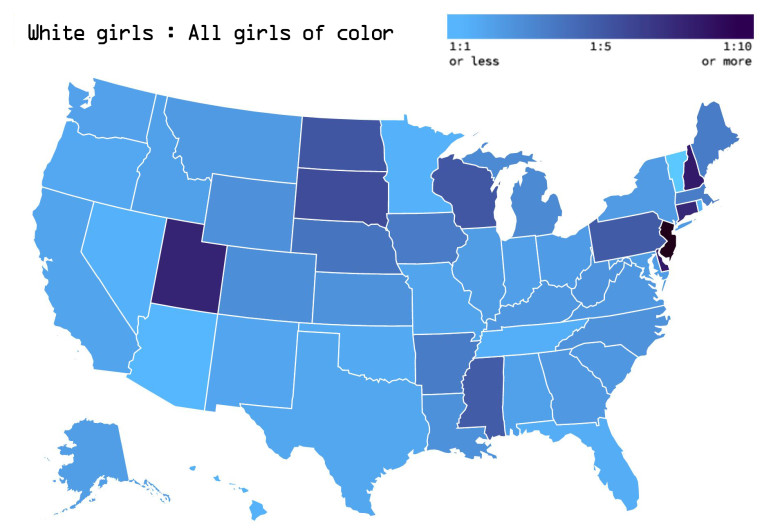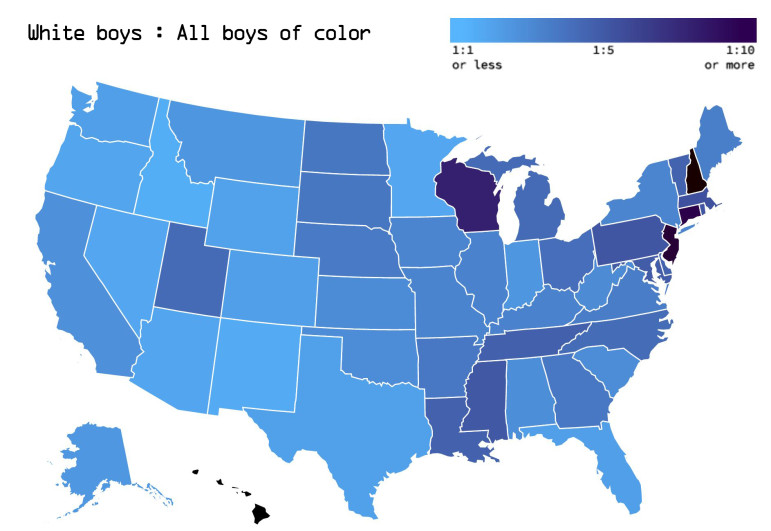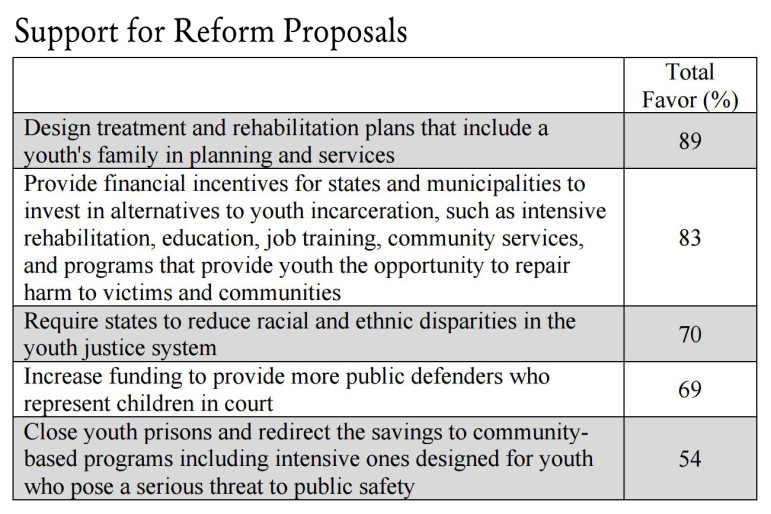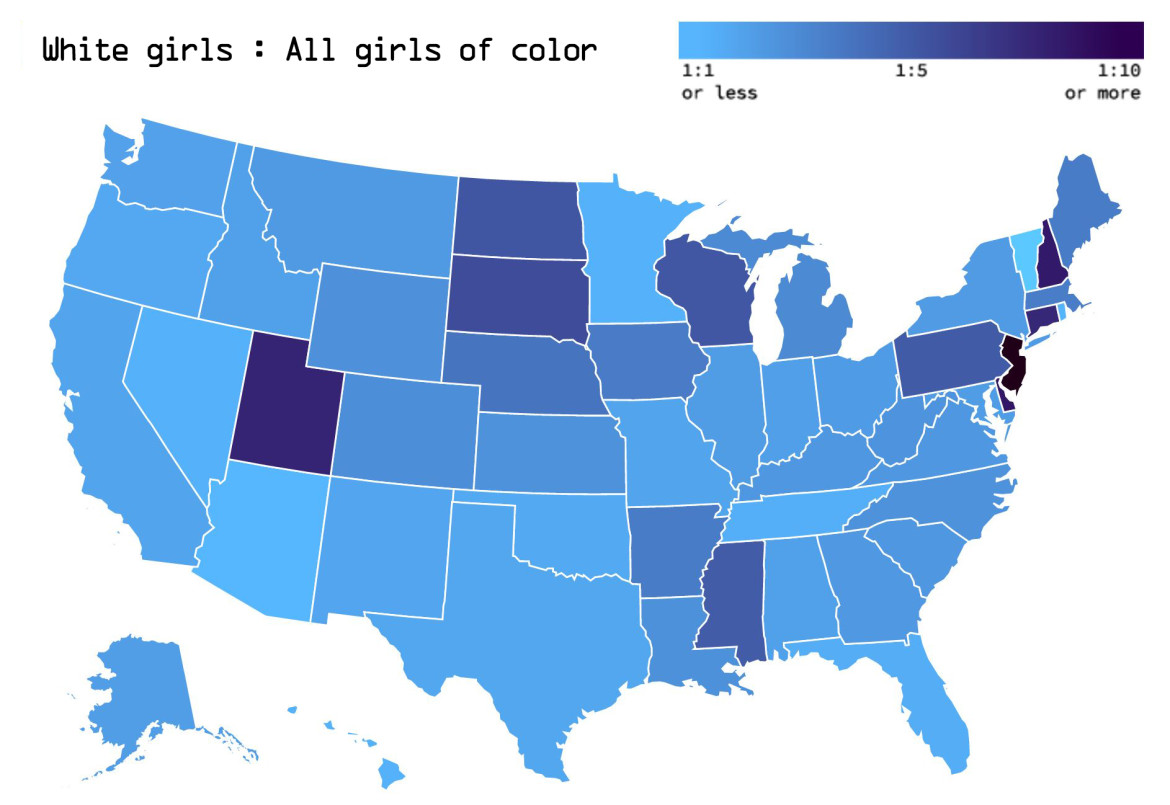
Custody rates are calculated per 100,000 juveniles ages 10 through the upper age of original juvenile court jurisdiction in each state. Map shows breakdowns of incarcerated youth by race, ethnicity and gender as compared to the general youth population in that state. The lightest blue represents a ratio of 1:1 or less; the darkest blue represents 1:10 or more.
WASHINGTON — More than half of Americans support closing youth prisons and redirecting the savings to community-based programs, data that gives momentum to efforts to close facilities around the country, advocates say.
The Youth First Initiative, a national campaign to close youth prisons, released today polling data that delves into Americans’ attitudes about incarceration, punishment and rehabilitation.
“We’re very encouraged by the results and we think this matches with the political will we’re seeing,” said Liz Ryan, CEO of Youth First.
A bipartisan group of governors — from Connecticut, Illinois and Virginia — have recently said they would like to close some of their states’ largest and oldest prisons.
 Youth First supports state-based advocates who are pushing to close youth prisons and overhaul juvenile justice systems. The group aims to work with partners in 15 states during the next five years to cut youth incarceration by 50 percent.
Youth First supports state-based advocates who are pushing to close youth prisons and overhaul juvenile justice systems. The group aims to work with partners in 15 states during the next five years to cut youth incarceration by 50 percent.
“It’s a tough issue and state advocates are going right at it. We’re really encouraged and we want to support them any way possible,” Ryan said.
Youth First also released a data visualization tool that maps the nation’s 80 oldest and largest youth prisons, along with data on racial and ethnic disparities.
Ryan said it’s critical that reforms narrow the gaps in incarceration rates among racial groups, as well as bringing down overall numbers.

Polling data
The poll showed that 92 percent of Americans think the top priority of the juvenile system should be to help young offenders get back on track and be less likely to commit another offense.
Very large majorities supported efforts to include juveniles’ families when designing treatment and rehabilitation plans and to provide financial incentives to states and municipalities to invest in alternatives to incarceration — at 89 percent and 83 percent, respectively.
The poll also found broad support for requiring states to reduce racial and ethnic disparities and increase funding to hire more public defenders for youth — at 70 percent and 69 percent, respectively.
[Related: Restorative Justice Can Help Stop the School-to-Prison Pipeline, NY Panel Says]
Support for closing youth prisons and redirecting savings to community-based programs came in at 54 percent. While lower than support for many of the other proposals, Ryan said the finding is encouraging, particularly because the question specifically referenced alternatives for youth who pose a serious threat to public safety.
She said that indicates support for youth who have committed serious offenses, not only youth who commit status offenses such as running away or breaking curfew, or low-level crimes.
The poll was conducted in January 2016 by GBA Strategies and has a margin of error of 3.1 percentage points.

State campaigns
The Youth First Initiative is already working with campaigns in Virginia, West Virginia, Kansas, New Jersey and Connecticut.
In Virginia, the RISE for Youth campaign is working to close the two remaining youth prisons in the state and redirect the money to community-based alternatives to incarceration.
The campaign has focused on making sure youth and families who have experienced the system are part of the conversation about how to reform it.
Personal experiences can help make the issue real for stakeholders who don’t understand the day-to-day life of juveniles, said Da'Quon Beaver, a community organizer at the Legal Aid Justice Center who was incarcerated in the past. The center is part of the RISE campaign.
“I’ve seen first-hand what goes on in these facilities — the good and the bad. I know what worked for me and what didn’t and what worked for other youth,” he said.
More related articles:
The Importance of Evidenced-Based Research in Establishing Juvenile Justice Policy
